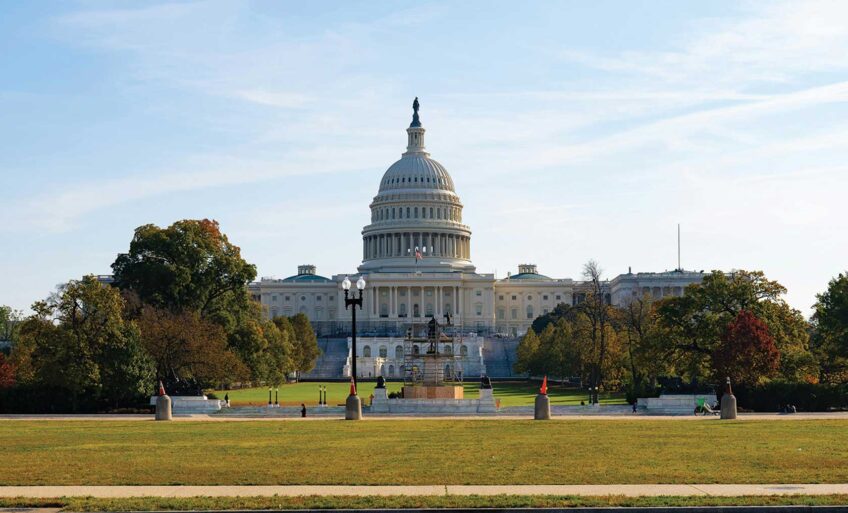It’s hard to believe it’s already been 100 days since Donald Trump’s return to the White House, and at the same time, that it’s only been 100 days. The shape of his second term quickly came into focus. Executive orders have come fast and furious. Federal protections, programs and agencies that serve women, immigrants, LGBTQIA+ communities and working families are once again under threat. The message from the administration is loud and very clear: We are returning to a past many of us were never safe in.
As a Black woman in America, I know that past intimately. This country has always carried two histories: One written in its founding documents and taught in history books, the other etched into the backs and bones of those who were enslaved, excluded and exploited. Those are my people. People like Sojourner Truth, to Harriet Tubman, to Fannie Lou Hamer, to Ella Baker — Black women have long stood at the intersection of democracy’s promise and its betrayal.
We’ve never had the luxury of waiting for change; we had to build it ourselves, often while being left out of the very movements we helped to fuel. So, when I see young women pushing back today, I see them standing in a long, unbroken line of leaders who chose community over chaos, care over cruelty and vision over violence.
Again, that history is not something you will see in most textbooks; it lives in our organizing, in our communities, in how we show up for one another. And it’s this legacy that today’s young women are building upon, often with new tools, but grounded in familiar truths.
A second term, a familiar pattern
In just over three months, the Trump administration has rolled out a number of policies with sweeping consequences. Immigrant communities have been hit hard, with a dramatic increase in ICE raids and deportation efforts without due process. Federal support for diversity, equity and inclusion programs has been gutted. Education and healthcare budgets face steep cuts. Tariffs and economic policies threaten working-class communities most directly, especially young Black women who are already struggling to make ends meet.
Much of this is part of “Project 2025,” a policy blueprint backed by conservative groups aiming to centralize presidential power, curb our freedoms and reshape the federal government in ways that serve the wealthy and well-connected. To make matters worse, it’s not even subtle. And for many, it’s deeply personal.
Young women are leading a different kind of response
At Supermajority, we are uplifting a generation of young women, between the ages of 18 and 35, who are stepping into their power in a different way. Their activism isn’t always loud, but it’s consistent. For them, it’s not just about protest, though protests still matter. It’s about serving their communities through volunteerism, in mutual aid collectives, at the polls and in conversations with their neighbors and coworkers.
These women are on the move, they’re mobilizing, they’re rejecting fear and fatigue, choosing instead to act with clarity and purpose. And they’re doing it in ways that reflect the values of a new generation that redefines what civic engagement looks like through community and service.
In Arizona, despite the outcome of the general election, Latina organizers are still rallying together for grassroots movements across the state. In Detroit, young Black women are facilitating community safety trainings that prepare residents to navigate increased police presence. Online, queer and trans women are creating toolkits to help others understand the shifting legal landscape and protect their rights.
These women aren’t waiting for permission or looking for recognition. They are deeply rooted in their communities and clear about what’s at stake. They understand that care is not soft — it’s strategic.
Organizing from the ground up
One of the most powerful lessons from this moment is that resistance doesn’t have to mirror the aggression it’s responding to. Many of these young leaders we engage with are choosing a path that centers joy, restoration and community. They’re building networks of support that can outlast any news cycle or administration.
They’re also investing in each other. At Supermajority, we’ve seen an influx of young women joining our trainings, showing up to digital organizing calls, and leading organizing efforts across a number of states. These leaders want tools and connection. That’s why they’re asking hard questions, like: How do we stay in this work for the long haul? How do we care for and support each other while doing it? And how do we build something that lasts longer than any one president?
That’s where the energy is. Not just in pushing back, but in building forward.
Reimagining what power looks like
When we say that women are the most powerful force in America, we mean it, and we have receipts. But power doesn’t have to look like dominance or control. It can look like care circles, or showing up for a neighbor’s eviction hearing, or crafting legislation, as challenging as that is.
What young women are showing us right now is that resistance is a practice and in a time and, in a time when top-down leadership is failing so many, they’re proving that grassroots leadership will never end.
So, while the headlines may focus on what’s being “undone” in Washington, we see what’s being created in communities across the country. And we believe in that more than anything.
Jara Butler is the chief impact officer at Supermajority, a national organization dedicated to building women’s collective power through advocacy, education and community.






